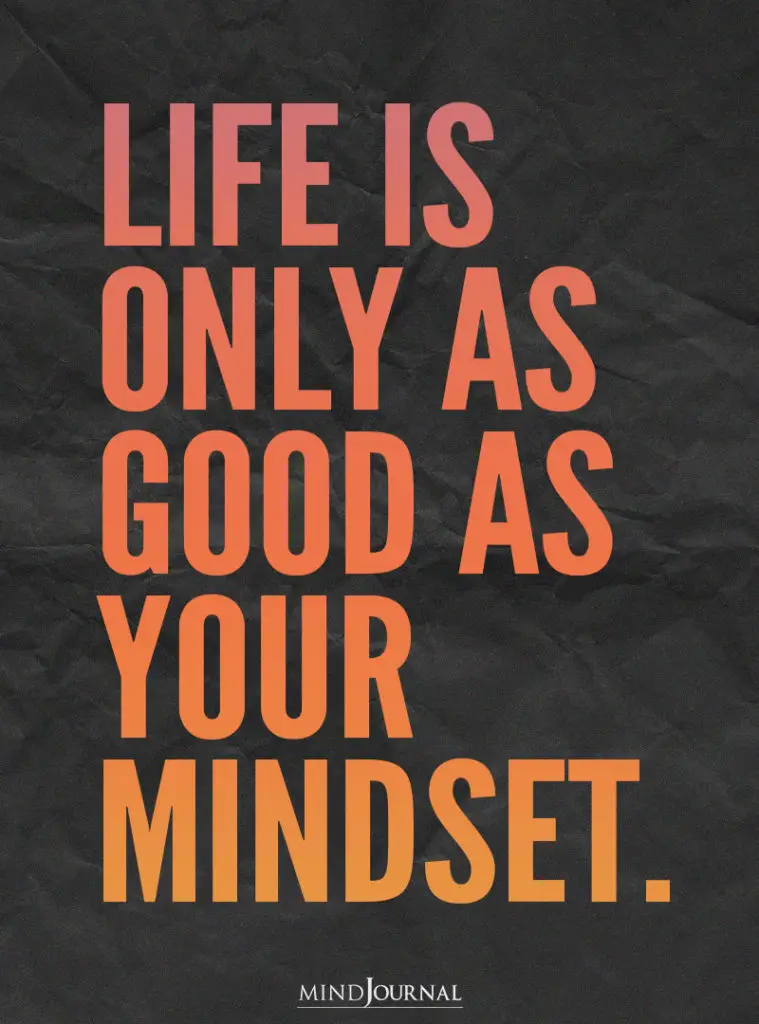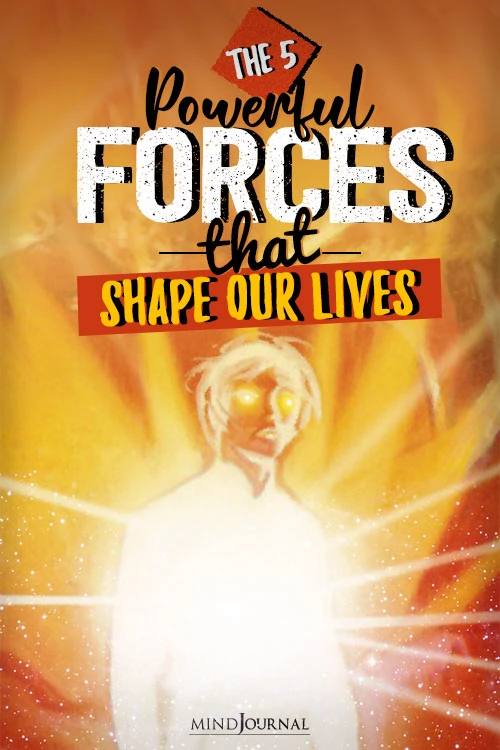There are various things that can influence our life. But do you know about the 5 powerful forces that shape our lives? You need to give attention to each one of them if you wish to influence to shape and develop your character.
Part I: Do we actually possess free will?
KEY POINTS:
- Five forces outside of our control have a big impact on who we become.
- These include our genes, upbringing, popular culture, technology, and unexpected events.
- The power of these five forces makes it difficult to reconcile free will as a force in our lives.
Choices, options, alternatives, preferences, opportunities, decisions—these are all words that have a powerful impact on our collective psyches as human beings.

They evoke free will and self-determination, the ability to become whoever we want to become, and the ability to opt for whatever road we choose in our life’s journey. Yet, whether we actually possess these attributes has been a point of discussion—and contention—since the earliest philosophers began to ponder our existence.
In this article, I will explore what I believe are the five most powerful forces that shape our lives. I will also muddy the waters in terms of how much freedom we do have to choose our life’s path.
Here are Five Powerful Forces That Influence Our Lives
1. Genes
The impact of genes on who we become has been demonstrated repeatedly in the scientific community. The general consensus is that genes account for about 50 percent of our development. Our genes determine many physical attributes, including height, body type, eye and hair color, and susceptibility to certain diseases. Personality traits have been found to be derived from our genes, including extraversion, neuroticism, agreeableness, conscientiousness, openness, and temperament. We can either thank or curse our parents for the genes they gave us.
Despite the significance of genes on our development, I don’t actually find it helpful to talk about them. First, we don’t know how “good” our genes are until we test our limits. Second, we can’t do anything about the genes we are given, so it would be a fruitless endeavor to dwell on them. Third, so-called good genes only get us to the front of the pack at the start line and say little about where we will finish.
Related: How Much of Your Happiness Is Under Your Control?
2. Upbringing
If genes account for half of the influence on our development, then our environment must account for the other half. Recent research has reported that 20 to 50 percent of the differences in child development are due to parental influences.
A central premise of my work is that “our children become the message we get the most.” And parents have the earliest, most immediate, and longest-lasting impact on what those messages will be. Our values and attitudes about ourselves, relationships, education, career, religion, politics, the list goes on, initially come from our upbringing.
Like genes, we don’t choose the upbringing we have or the messages we receive as children. To a large degree, we are victims of whatever messages we receive in childhood through our parents’ actions and words
When we are young, we tend to adopt the dominant messages within our family uncritically because of their early presence and consistency, and we lack the maturity to separate healthy from unhealthy messages. This early exposure is woven into the fabric of our young lives, gaining traction in our minds and becoming our default when evaluating our world throughout childhood and, most often, into adulthood.
Unlike genes, as we mature and our critical-thinking skills develop, we become increasingly capable of making choices about whether we adopt or reject those messages. As we separate from our parents and venture out into the world of school, friends, and work, we interact with a diverse range of people with perspectives that differ from our own.
In that diaspora, we are exposed to cultures that may be vastly different from our own. Through dissatisfaction with the status quo of our lives, self-exploration, and conscious choice, it may be possible to make deliberate decisions to jettison the values, attitudes, and beliefs that have guided our lives to that point and choose others that better align with who we are in the present and where we want to go in the future.
3. Popular Culture
Exposure to popular culture has always played an essential role in who we become. As social beings, we typically adopt the values, attitudes, and beliefs of the culture that are most present in our lives. The initial culture we are exposed to is our family culture, but as we move out into the world and are exposed to messages from peers, school, extracurricular activities, and media, the influence of family culture diminishes, and the impact of our popular culture increases.
In past generations, parents had relatively tight control over the popular culture to which their kids were exposed. Parents had almost complete control over the environment in which they lived, including the neighborhood, school, houses of worship, and activities.
Yes, the broader popular culture could intrude in the form of television, radio, print, and advertising in these media. But in each case, the choices of where we received our popular culture (e.g., three TV channels, one local newspaper, a few magazine options) and exposure to them, in terms of time, was limited.
Popular culture is a subtle yet powerful force in our lives that we don’t notice because it is all around us and woven into every aspect of our lives. As social beings, we crave a shared cultural experience because it is, in a way, the sinew that connects our family, friends, peers, co-workers, and others in our lives.
To reject our popular culture can feel like being left alone on a deserted island. As such, choosing to eliminate popular culture from our lives would seem to be daunting, if not downright impossible.
4. Technology
This dramatic rise in the presence and impact of technology on our lives hasn’t just influenced the extent that popular culture can affect who we become.
Technology has become a force in itself that has a well-recognized and growing effect on every aspect of our development, whether cognitive, emotional, social, educational, political, and beyond. This influence is no longer just a matter of degree but also of kind; as Marshall McLuhan so presciently stated in 1967, “the medium is the message.”
Technology, whether the telegraph, radio, television, or computer, has always been driven by the profit motive, and much of the use of technology, from past eras to the pre-internet age, involved advertising intended to sell products to its consumers.
However, social media has made us the product in the form of our information, data, online usage, and time spent and engagement in the various social media, which is then sold to advertisers for huge profits by the likes of Facebook, Instagram, Twitter, and others.
This commoditization of our attention has produced a new field of computer science called “persuasive technology,” in which Big Tech spends billions of dollars a year aimed at devising ways to “hook” us on their particular platform and literally change our values, attitudes, beliefs, behaviors, and habits, all intended to increase profit for their shareholders with little regard for whether it is healthy for us or beneficial to our society.
Though, in theory, we could choose to reduce our involvement in technology, as I just mentioned relative to persuasive technology, that shift is easier said than done. Moreover, to disconnect from technology as a force in our lives would mean disconnecting from the social ties that bind us in this tech-driven world in which we now live.
Additionally, research is demonstrating that exerting so-called free will and deciding to eschew technology is meeting resistance not just because of its psychologically and emotionally addictive properties, but, more powerfully, it is causing neurophysiological addiction similar to that experienced with alcohol, drugs, and gambling.
Related: The Positive Impact of Modern Technology in Our Day to Day Lives
5. Unexpected Events
This fifth influence is not something that we often think of as having a significant impact on our development. Yet, one leading researcher argues that it is more influential than environmental factors over which more deliberate and premeditated control is possible: for example, parenting and school.
I liken our lives to asteroids hurtling through space. Unless a force is exerted on our lives, they will continue to follow their current path until we die. Unexpected events can act like a blunt force on that asteroid that is our lives, causing a shift in trajectory. Unexpected events can be both positive (e.g., meeting your future spouse, getting an unplanned job offer) or negative (e.g., becoming seriously ill, being in a car accident) and may shape your future self in equally unanticipated ways, also in either good or bad ways.
Another way unexpected events affect our development is through genetic switch flipping because unplanned occurrences in life, particularly those with significant emotional import, have the ability to turn on a previously dormant gene.
For instance, the death of a parent or the loss of a job may trigger a genetic predisposition to depression. Or exposure to something toxic in the environment can switch on a cancer gene.
Of the five forces I’ve discussed so far, unexpected events are the most elusive and difficult to avoid as an influence on who they become. By their very nature, we can’t predict or prepare for them.
We can’t readily mitigate their impact on our lives. And the shock of unexpected events (and the related trauma of those that are negative) can be both destabilizing and cause our “life inertia” to shift its trajectory in an unhealthy direction. The one way we can choose how unanticipated events impact us is in how we respond to them, whether, for example, as a threat or a challenge.
You may not have control over these five powerful forces that shape life but you can influence life by determination and resilience. Tell us your thoughts in the comments below.
Written by: Jim Taylor Ph.D.
Originally appeared on: Psychology Today
Republished with permission









Leave a Reply
You must be logged in to post a comment.